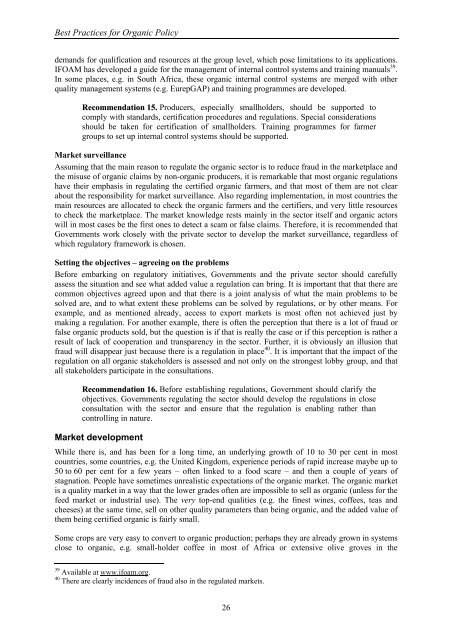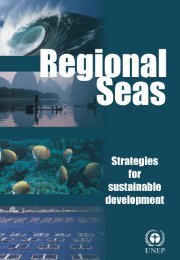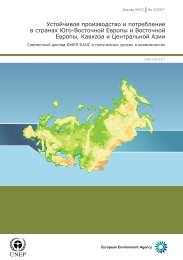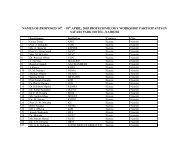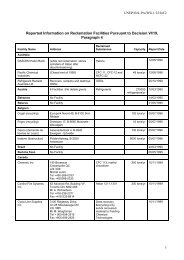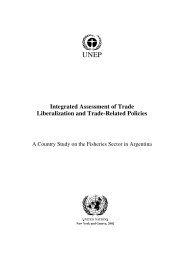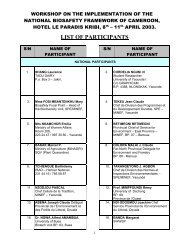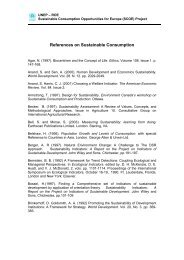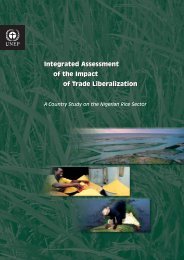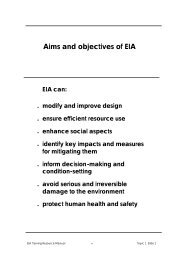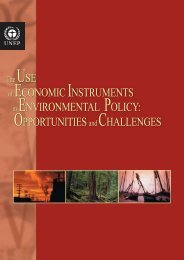Best Practices for Organic Policy - What developing country - UNEP
Best Practices for Organic Policy - What developing country - UNEP
Best Practices for Organic Policy - What developing country - UNEP
Create successful ePaper yourself
Turn your PDF publications into a flip-book with our unique Google optimized e-Paper software.
<strong>Best</strong> <strong>Practices</strong> <strong>for</strong> <strong>Organic</strong> <strong>Policy</strong><br />
demands <strong>for</strong> qualification and resources at the group level, which pose limitations to its applications.<br />
IFOAM has developed a guide <strong>for</strong> the management of internal control systems and training manuals 39 .<br />
In some places, e.g. in South Africa, these organic internal control systems are merged with other<br />
quality management systems (e.g. EurepGAP) and training programmes are developed.<br />
Recommendation 15. Producers, especially smallholders, should be supported to<br />
comply with standards, certification procedures and regulations. Special considerations<br />
should be taken <strong>for</strong> certification of smallholders. Training programmes <strong>for</strong> farmer<br />
groups to set up internal control systems should be supported.<br />
Market surveillance<br />
Assuming that the main reason to regulate the organic sector is to reduce fraud in the marketplace and<br />
the misuse of organic claims by non-organic producers, it is remarkable that most organic regulations<br />
have their emphasis in regulating the certified organic farmers, and that most of them are not clear<br />
about the responsibility <strong>for</strong> market surveillance. Also regarding implementation, in most countries the<br />
main resources are allocated to check the organic farmers and the certifiers, and very little resources<br />
to check the marketplace. The market knowledge rests mainly in the sector itself and organic actors<br />
will in most cases be the first ones to detect a scam or false claims. There<strong>for</strong>e, it is recommended that<br />
Governments work closely with the private sector to develop the market surveillance, regardless of<br />
which regulatory framework is chosen.<br />
Setting the objectives – agreeing on the problems<br />
Be<strong>for</strong>e embarking on regulatory initiatives, Governments and the private sector should carefully<br />
assess the situation and see what added value a regulation can bring. It is important that that there are<br />
common objectives agreed upon and that there is a joint analysis of what the main problems to be<br />
solved are, and to what extent these problems can be solved by regulations, or by other means. For<br />
example, and as mentioned already, access to export markets is most often not achieved just by<br />
making a regulation. For another example, there is often the perception that there is a lot of fraud or<br />
false organic products sold, but the question is if that is really the case or if this perception is rather a<br />
result of lack of cooperation and transparency in the sector. Further, it is obviously an illusion that<br />
fraud will disappear just because there is a regulation in place 40 . It is important that the impact of the<br />
regulation on all organic stakeholders is assessed and not only on the strongest lobby group, and that<br />
all stakeholders participate in the consultations.<br />
Recommendation 16. Be<strong>for</strong>e establishing regulations, Government should clarify the<br />
objectives. Governments regulating the sector should develop the regulations in close<br />
consultation with the sector and ensure that the regulation is enabling rather than<br />
controlling in nature.<br />
Market development<br />
While there is, and has been <strong>for</strong> a long time, an underlying growth of 10 to 30 per cent in most<br />
countries, some countries, e.g. the United Kingdom, experience periods of rapid increase maybe up to<br />
50 to 60 per cent <strong>for</strong> a few years – often linked to a food scare – and then a couple of years of<br />
stagnation. People have sometimes unrealistic expectations of the organic market. The organic market<br />
is a quality market in a way that the lower grades often are impossible to sell as organic (unless <strong>for</strong> the<br />
feed market or industrial use). The very top-end qualities (e.g. the finest wines, coffees, teas and<br />
cheeses) at the same time, sell on other quality parameters than being organic, and the added value of<br />
them being certified organic is fairly small.<br />
Some crops are very easy to convert to organic production; perhaps they are already grown in systems<br />
close to organic, e.g. small-holder coffee in most of Africa or extensive olive groves in the<br />
39 Available at www.ifoam.org.<br />
40 There are clearly incidences of fraud also in the regulated markets.<br />
26


